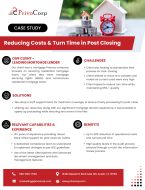Everything that has a beginning also has an end. Mortgage Processing is no exception.
After closing the mortgage, the mortgage lender must undergo a crucial process, which the industry calls a mortgage post-close audit. A mortgage post-close audit is a process where the auditors evaluate the entire mortgage process and documents to ensure that all compliances are met.
What Happens During A Mortgage Post-close Audit
Can you remember a time when you hear things like cross your I’s and dot your t’s? That’s a close picture of what a mortgage post-close audit is. In one sentence, the auditors conduct a quality test to see if any deficiencies exist in the entire mortgage process.
Now let’s take a deeper dive into the post-close audit process.
Post-closing Data Quality Audit
Mortgage processing in itself is a big umbrella that consists of several processes. Each of these processes involves different data sets of the borrower. A good example is the underwriting process.
In this stage, the auditor conducts error checks on the data and addresses problems that the underwriter may highlight.
Retrieval of Trailing Documents
We can also term this process as document tracking. The auditor tracks essential documents such as tax records, liens, trust deeds, uniform commercial code records, etc. Since the listed document aids the lender’s decision, the auditor must ensure completeness and accuracy.
Mortgage Electronic Registration System(MER)
The MER is a system where approved loans are registered. The approved loan is registered to enable the lender to track loans even for the future.
The mortgage can be registered as MOM, non-MOM, and MERS iRegistration.
Collation of the Post-closing Mortgage Loan Package
After a successful loan closure, there is a need to gather the necessary documents which make up the post-closing loan package. The package includes addendums, HUD-1 with signatures, trust deeds with riders, etc.
The process is essential because it can be used to protect the loan against fraud.
Tax, Reserves, and Insurance Audits
The auditor ensures tax requirements are met. Aside from taxes, assessment is done on reserves and insurance documents.
What needs to be done to reduce audit risk
Here is a fact, if the audit isn’t successful, you may end up wasting all time and resources put into the mortgage process from the beginning.
Of course, there is a way every lender can reduce and even overcome the risk attached to a post-closing audit.
Outsourcing to a solution provider like PrivoCorp will help gather necessary files and ensure all documents adhere to compliance.
PrivoCorp is devoted to providing a mortgage post-close audit solution for every lender.
Why Lenders Need Not Worry About the Post-close Audit
PrivoCorp is the reason why a lender should never worry about the post-close audit. The post-close audit may seem scary, but PrivoCorp offers an easy way out.
With our mortgage post-close audit support, you become audit-ready. That’s because we will process your files and ensure compliance.
We will;
- Perform trailing documents retrieval
- Perform tax, reserves, and insurance audits
- Carry out post-closing data quality audit
- Assemble the loan package
- See out the mortgage electronic registration system (MER)
- Ensure overall quality control audit
In the end, you breeze through the post-close audit stress-free and in flying colors. PrivoCorp offers all this for just $49 per file.
Support services from PrivoCorp will save you time and resources. Here are the benefits our services offer.
- A flexible engagement model: there are no minimum file requirements
- Super easy payments: you have the luxury of paying at the go with your credit card
- Ensure adherence to compliance: our experts see to it that all regulatory requirements are optimally handled
- Audit ready: this is no exaggeration as we leverage process expertise to ensure all files are 100% prepared.











